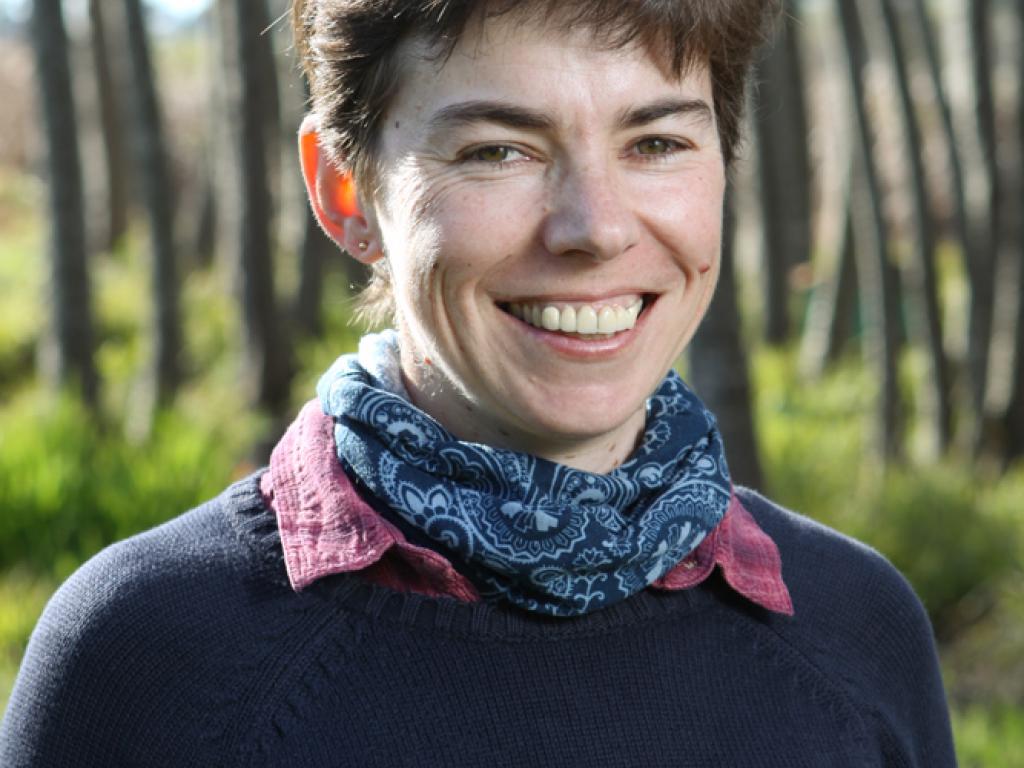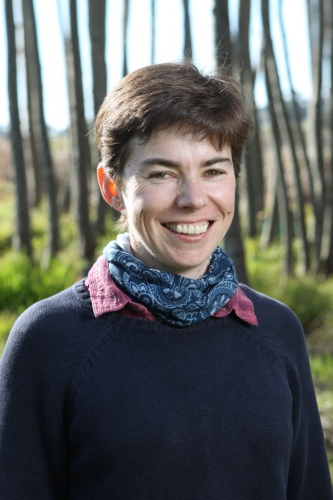The opportunity presented by the call for decolonization


Dr Margaret Blackie (pictured above) presented the Department of Chemistry Transformation Committee seminar, with a talk entitled, "The opportunity presented by the call for decolonisation".
In the wake of the #RhodesMustFall and #FeesMustFall protests, the call for a decolonized education remains. Whilst many tertiary science educators have dismissed the call as irrelevant to science education, Dr Blackie argues that it provides a timely and useful invitation to reflection on the purpose of tertiary science education. The project of decolonization is different in STEM fields, because of orientation to knowledge. However the work Maldonado-Torres who writes about coloniality of power, coloniality of knowledge and coloniality of being, shows that there is still much to be considered in terms of power and being. This then affords the possibility of thinking about science education in broader terms. In the talk I present some tools which can be used to enhance science education whilst taking cognizance of the person of the scientist in training.
Solid academic grounding: Dr Blackie started out with a BSc at Rhodes, BSc Hons and PhD in medicinal chemistry at UCT (supervised by John Moss and Kelly Chibale) and then went on to do three postdocs: one at the Universite des sciences et technologies in Lille, France (med chem), she held a Claude Leon Fellowship and worked with Kelly Chibale for two years. (med chem) and then finally did a postdoc with Jenni Case at the Center for Research in Engineering Education at UCT.
In terms of her journey to this point: between her BSc and BSc (hons) she took a gap year an taught high school maths. Between her first and second postdocs she worked in a spirituality center for 4 years before returning to chemistry. She describes how . “It was only when I did my postdoc with Jenni Case in engineering education that I found a way that I could be myself and be an academic. The combining of education research with Medicinal chemistry research gave me a way to not have to cut off half of myself to do the job. Now I also teach some theology, so all parts of my being are combined in my current job. I love the deep complexity of chemistry, but I also value human development tremendously”.
How Dr Blackie become interested in the topic of decolonization and Science:
Following the #ScienceMustFall video I was curious as to how to have a serious conversation about decolonisation. I thought the best approach was to take the call seriously, and then to try and figure out what it means in science education. Fundamentally the starting point is a little different in STEM subjects. The first point is not necessarily to radically change the curriculum, but to recognise that power and being are operational in science education too. We can’t change the knowledge but there is a good deal to be done in terms of recognising how power and being impact the student.
Why this topic is important to her:
The experience of alienation described by students should be taken seriously because it will impact their academic performance. And we need to adapt to a changing student body. We do need to ask seriously what it means to teach science in Africa, and how to prepare African scientists. That task may or may not be substantially different to doing these things elsewhere in the world. But we should at least entertain the possibility that it might be a little different, before we dismiss the idea out of turn.
The Talk: Opportunity Presented by the Call for Decolonisation
In her talk, Dr Blackie highlighted three major factors impacting tertiary education in South Africa now, namely (a) Decolonisation (b) the 4th Industrial Revolution and (c) The Covid-19 Pandemic. She expressed the need to form a broader view of what we are doing and what the value is of an undergraduate degree in Science—challenging our presumptions. Kicking off her talk, she asked the audience to think about how they were responding to the topic and perhaps questions regarding what a white Zimbabwean chemist was doing talking about decolonisation. Explaining that what started her off thinking about this topic was when the UCT student made the “Science Must Fall” video with a claim to throw out Newton, Dr Blackie recognised that although it wouldn’t be helpful to throw out Newton, it was important to consider that maybe the student had something important to say.
The alienation that students were experiencing needed to be acknowledged because this clearly does impact their engagement and this raised the issue of how to facilitate conversations between students and scientists. Dr Blackie clarified that decolonisation takes a different shape in STEM because the nature of the project of education is different. In STEM subjects the focus is on the conceptual understanding (what you know), as contrasted with Humanities where the focus is on the development of the worldview and the orientation to society and knowledge). In Science the relationship to knowledge is strong and the relationship to society is weaker and scientists can be blind to the way that the other fields of education operate. The implications of this are that even though Science is favouring the relationship to knowledge, there is a relationships to society that is operational. She pointed out that regardless of the educational project we are involved in, there are three things that we need to take into account, namely: Power; Being & Knowledge. All three of these are operational whether we recognise them or not. In science, we are ‘Knower Blind’ - Scientific knowledge is objective and socially neutral, however we can be blind to the person as a scientist, who we cannot presume is objective and socially neutral. Dr Blackie emphasised how we tend to conflate neutrality of scientific knowledge with presumed neutrality of scientists and that this is a dangerous step to make. She made the point that the second conflation we make is that science education is not the same as science—education can never be socially neutral—the education project is always socially embedded.
What then is the value of an undergraduate Science degree? We will still need to teach the periodic table for example, but the question we need to ask is: How are power and being operational in our sphere? Dr Blackie suggested a process of embarking on the project of thinking about decolonisation and suggested that the decolonised curriculum is probably ten years away, however right now, we need large groups of community thinking about this and the ways in which being and power are operational in lecture theatres and courses.
Dr Blackie expressed her view that in terms of Chemistry education, we are good at the level of third year exams and making sure students have a good conceptual understanding—seeking to discern whether students can reproduce puzzle pieces and join them together in an attempt to prepare them for lifelong learning. However, she challenged the audience to question whether students know what they know and the know the limitations of their knowledge. She asked whether they can judge ‘I’m confident to solve this problem’ or ‘I’m lost her and need to find some help’. As academics, she reflected, we can do a better job of helping students reflect on their knowledge. Furthermore, she challenged academics to think about how our education system is infused by Western individualism and that a student who experiences alienation is likely to do worse than a student who feels comfortable in their environment. Judgement requires students to ask, ‘Have I correctly understood this concept in the way that the community of chemists understands this thing?’ To test this understanding, the student needs to talk to a lecturer, look at a textbook, discuss with a friend—all of which are social activities. There is thus a crucial shift from me understanding, moving towards me understanding as the community understands. The shift is thus from the student trying to do their own thing, to the student becoming a member of the community who holds this knowledge.
This potentially changes what we are doing when we educate. Education is then not about an individual passing an exam rather it is about induction into the community—it thus we have an obligation to help those who feel that they don’t fit in. This shift into a space where power and being play a role potentially provides a platform for a better sense of engagement. It leads to me questioning myself: What do I think I am doing? And where do I need to be more careful? Dr Blackie highlighted how examples are socially infused and how we need to question whether examples from our own experience become hurdles to understanding. This requires recognition that my life experience as a lecturer is not necessarily normative, but is my experience/ voice. She invited the audience to think about the most obvious starting points for themselves and encouraged them to think about how this could mould/ shape their teaching and how decolonisation might work in their classrooms; while being aware that we are ‘knower blind’ in science education. Dr Blackie ended her talk with the deep question of ‘What is the purpose of our degree?’ and what is the broader purpose of the degree beyond sound conceptual understanding.
To listen to the talk click here
Dr Blackie is a Senior Lecturer at Stellenbosch University in the Department of Chemistry and Polymer Science. She received her BSc degree in Chemistry from Rhodes University in 1996, followed by her BSc(Hons) and PhD degrees in Chemistry from the University of Cape Town, in 1998 and 2002, respectively. She pursued postdoctoral fellowships in medicinal Chemistry with Professor Jacques Brocard at Université des Sciences et Technologies, Lille, France (September 2002 – February 2003) and Professor Kelly Chibale at the University of Cape Town (January 2007 – December 2008), as well as a postdoctoral fellowship in chemical education with Professor Jenni Case at the University of Cape Town (2009). She joined the Department of Chemistry and Polymer Science at Stellenbosch University in 2010 as a lecturer and has won several teaching awards since then. These include the prestigious Distinguished Teacher’s Award at Stellenbosch University and the South African Chemical Institute’s Education medal in 2020. Her research straddles the areas of medicinal Chemistry research (22 peer-reviewed articles) and chemical education (several articles, books and book chapters).